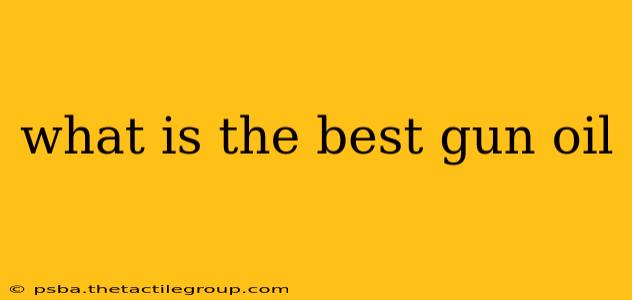What's the Best Gun Oil? A Deep Dive into Lubrication for Firearms
Choosing the right gun oil is crucial for maintaining the reliability and longevity of your firearms. The "best" oil, however, isn't a one-size-fits-all answer. It depends heavily on factors like climate, firearm type, and intended use. This comprehensive guide explores the key characteristics of gun oils, helping you make an informed decision for your specific needs.
Understanding Gun Oil Essentials
Before diving into specific brands, let's clarify what makes a good gun oil. Effective gun oil should possess several key properties:
- Lubricity: This is the oil's ability to reduce friction between moving parts, preventing wear and tear. High lubricity means smoother operation and increased lifespan.
- Corrosion Protection: Rust and corrosion are the enemy of firearms. A good oil forms a protective barrier, preventing moisture from damaging metal surfaces. This is especially critical in humid or coastal environments.
- Cleanliness: The oil shouldn't attract dirt and grime, which can accelerate wear and malfunction. A clean-burning oil is preferable to prevent residue buildup.
- Temperature Stability: Extreme temperatures, whether hot or cold, can affect oil viscosity. The ideal gun oil maintains its lubricating properties across a wide temperature range.
- Compatibility: Ensure the oil is compatible with all the materials in your firearm, including various metals, polymers, and wood.
Top Gun Oil Categories & Their Pros and Cons
The market offers a variety of gun oils, each with its strengths and weaknesses. Here are some popular categories:
1. Synthetic Gun Oils:
- Pros: Often boast superior lubricity, corrosion protection, and temperature stability compared to traditional oils. They tend to stay cleaner and last longer.
- Cons: Generally more expensive than conventional oils.
2. Conventional Gun Oils (Petroleum-based):
- Pros: Readily available and relatively inexpensive. Suitable for general-purpose lubrication.
- Cons: May not offer the same level of corrosion protection or temperature stability as synthetics. Can attract more dirt and grime.
3. CLP (Cleaner, Lubricant, Protectant):
- Pros: Multi-purpose products designed for cleaning, lubricating, and protecting firearms. Convenient for simplifying maintenance routines.
- Cons: May not offer the same specialized performance as dedicated lubricants or corrosion inhibitors. Some CLP formulations may leave residue.
Factors to Consider When Choosing Gun Oil
- Climate: In humid climates, prioritize oils with strong corrosion protection. In extremely cold or hot conditions, consider oils designed for extreme temperature ranges.
- Firearm Type: Different firearms may have varying lubrication needs. Consult your firearm's manual for specific recommendations.
- Frequency of Use: For firearms used frequently, a more durable and long-lasting oil might be preferable.
- Budget: Gun oils range in price significantly. Find a balance between quality and cost that suits your needs.
Beyond the Oil: Proper Gun Care
Remember, the best gun oil is only part of the equation. Proper cleaning and storage practices are equally important for maintaining your firearms. Regular cleaning removes debris and prevents corrosion, while proper storage in a dry environment further minimizes the risk of damage.
Conclusion
The quest for the "best" gun oil is a personal one. By understanding the key properties of gun oil and considering your specific needs, you can choose a product that ensures your firearms remain reliable and in top condition for years to come. Always consult your firearm's manual for specific lubrication recommendations and safety precautions. Careful attention to both oil selection and proper firearm maintenance will ensure your weapons remain in peak operating condition.

